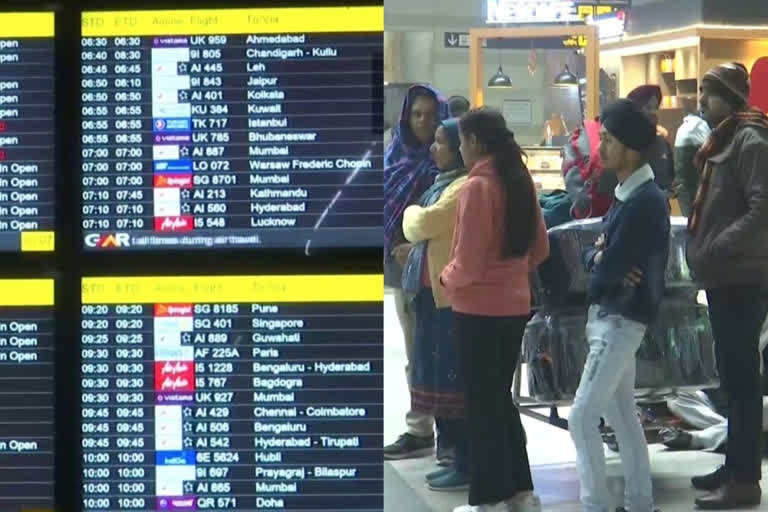New Delhi: Cold wave conditions abated in Delhi on Tuesday due to a fresh western disturbance affecting northwest India, even as a dense layer of fog lowered visibility to just 50 metres, affecting road and rail movement. The Safdarjung observatory, Delhi's primary weather station, recorded a minimum temperature of 6.4 degrees Celsius as against 3.8 degrees Celsius on Monday.
The weather stations at Lodhi Road and Palam logged a minimum temperature of 6.4 degrees Celsius and 7.5 degrees Celsius. An official of the India Meteorological Department (IMD) said the Palam observatory near the Indira Gandhi International Airport recorded a visibility level of 50 metres.
Flights, trains delayed
As cold wave pounds north India, several flights were delayed due to fog in Delhi on Tuesday. Flights delayed include Delhi-Kathmandu, Delhi-Jaipur, Delhi-Shimla, Delhi-Dehradun, and Delhi-Chandigarh-Kullu.
Thirty-nine trains were delayed by an hour to five-and-a-half hours due to the foggy weather, a Northern Railways spokesperson said.Satellite images showed a dense layer of fog persisting over vast swathes of north India, extending from Punjab to Bihar across Haryana, Delhi and Uttar Pradesh.
Cold wave conditions
Delhi saw cold wave conditions for the fifth consecutive day on Monday and the season's longest fog cover which crippled road, rail and air traffic movement. IMD officials said the Palam observatory had recorded visibility levels below 1,000 metres from 8:30 pm on Sunday to 4:30 pm on Monday.
Chilly weather in Delhi since the start of January strained power grids and posed challenges to homeless people. It also prompted the Delhi government to extend winter vacations in schools till January 15. Delhi logged a minimum temperature of 3.8 degrees Celsius on Monday, 1.9 degrees Celsius on Sunday, 2.2 degrees Celsius on Saturday, 4 degrees Celsius on Friday, 3 degrees Celsius on Thursday and 4.4 degrees Celsius on Wednesday.
Meteorologists attribute the long spell of intense cold to a large gap between two western disturbances, which meant frosty winds from the snow-clad mountains blew in for a longer-than-usual period. According to IMD officials, north India, including Delhi, will get short-term relief under the influence of the fresh western disturbance. The minimum temperature may increase to 8 degrees Celsius while the maximum is likely to go up to 20 degrees Celsius, the Met office said. (with Agency inputs)



